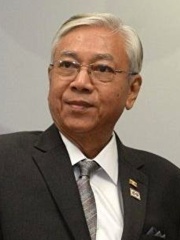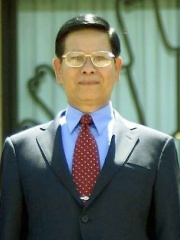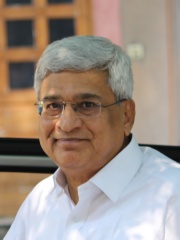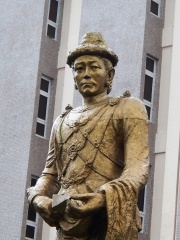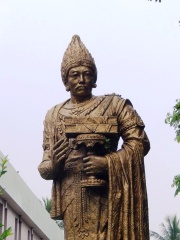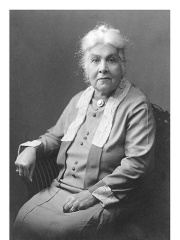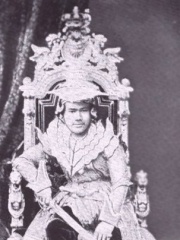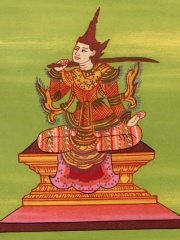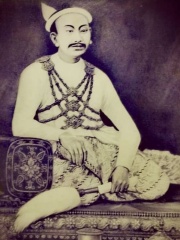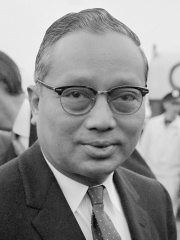
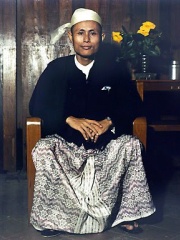
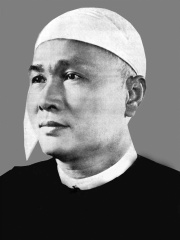
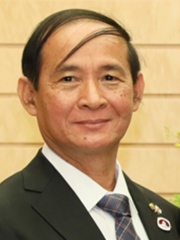
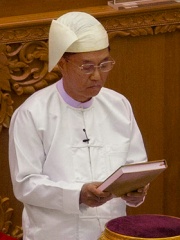
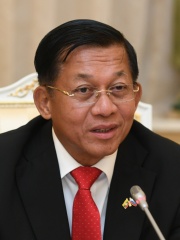
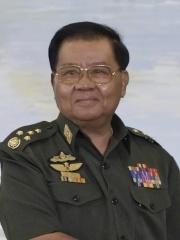
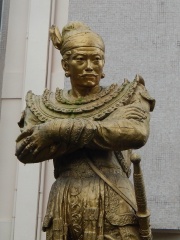
The Most Famous
POLITICIANS from Myanmar (Burma)
This page contains a list of the greatest Burmese Politicians. The pantheon dataset contains 19,576 Politicians, 27 of which were born in Myanmar (Burma). This makes Myanmar (Burma) the birth place of the 95th most number of Politicians behind Cambodia, and Luxembourg.
Top 10
The following people are considered by Pantheon to be the top 10 most legendary Burmese Politicians of all time. This list of famous Burmese Politicians is sorted by HPI (Historical Popularity Index), a metric that aggregates information on a biography's online popularity. Visit the rankings page to view the entire list of Burmese Politicians.

1. U Thant (1909 - 1974)
With an HPI of 75.35, U Thant is the most famous Burmese Politician. His biography has been translated into 81 different languages on wikipedia.
Thant (Burmese: သန့်, MLCTS: san., pronounced [θa̰ɰ̃]; 22 January 1909 – 25 November 1974), known honorifically as U Thant (), was a Burmese diplomat and the third secretary-general of the United Nations from 1961 to 1971, the first non-Scandinavian as well as Asian to hold the position. He held the office for a record 10 years and one month. A native of Pantanaw, Thant was educated at the National High School and at Rangoon University. In the days of tense political climate in Burma, he held moderate views positioning himself between fervent nationalists and British loyalists. He was a close friend of Burma's first Prime Minister U Nu and served in various positions in Nu's cabinet from 1948 to 1961. Thant had a calm and unassuming demeanour that won his colleagues' respect. He succeeded James Barrington as Burma's Permanent Representative to the United Nations. He was appointed Secretary-General in 1961, six weeks after his predecessor, Dag Hammarskjöld, had died in an air crash. In his first term, Thant facilitated negotiations between U.S. president John F. Kennedy and Soviet premier Nikita Khrushchev during the Cuban Missile Crisis of 1962, helping to avert a global catastrophe. Later, in December that year, Thant ordered Operation Grandslam, which ended a secessionist insurgency in Congo. He was reappointed as Secretary-General on 2 December 1966, by a unanimous vote of the Security Council. During his second term Thant was well known for publicly criticizing U.S. conduct in the Vietnam War. He oversaw the entry of several newly independent African and Asian states into the UN. He refused to serve a third term, and retired in 1971. Thant died of lung cancer in 1974. A devout Buddhist and the foremost Burmese diplomat on the international stage, he was widely admired and held in great respect by the Burmese populace. When the military government refused him any honours, riots erupted in Rangoon; these were violently crushed by the government, leaving scores of casualties.

2. Aung San (1915 - 1947)
With an HPI of 72.77, Aung San is the 2nd most famous Burmese Politician. His biography has been translated into 57 different languages.
Aung San (Burmese: အောင်ဆန်း, MLCTS: aung hcan:, pronounced [àʊɰ̃ sʰáɰ̃]; 13 February 1915 – 19 July 1947) was a Burmese politician, independence activist and revolutionary. He was instrumental in Myanmar's struggle for independence from British rule, but he was assassinated just six months before his goal was realized. Aung San is considered to be the founder of modern-day Myanmar and the Tatmadaw (the country's armed forces), and is commonly referred to by the titles "Father of the Nation", "Father of Independence", and "Father of the Tatmadaw". Devoted to ending British Colonial rule in Burma, Aung San founded or was closely associated with many Burmese political groups and movements and explored various schools of political thought throughout his life. He was a life-long anti-imperialist and studied socialism as a student. In his first year of university he was elected to the executive committee of the Rangoon University Students' Union and served as the editor of its newspaper. He joined the Thakin Society in 1938 and served as its general secretary. He also helped establish the Communist Party of Burma in 1939 but quit shortly afterwards due to vehement disagreements with the rest of the party leadership. He subsequently co-founded the People's Revolutionary Party (later the Burma Socialist Party) with the primary goal of Burmese independence from the British. Shortly before the outbreak of World War II, Aung San fled Burma and went to China to solicit foreign support for Burmese independence. During the Japanese occupation of Burma, he served as the minister of war in the Japan-backed State of Burma led by Dr. Ba Maw. As the tide turned against Japan, he switched sides and merged his forces with the Allies to fight against the Japanese. After World War II, he negotiated Burmese independence from Britain in the Aung San-Attlee agreement. He served as the 5th Premier of the British Crown Colony of Burma from 1946 to 1947. He led his party, the Anti-Fascist People's Freedom League, to victory in the 1947 Burmese general election, but he and most of his cabinet were assassinated shortly before the country became independent. Aung San's daughter, Aung San Suu Kyi, is a stateswoman, politician, and Nobel Peace Prize laureate. She was Burma's State Counsellor and its 20th (and first female) Minister of Foreign Affairs in Win Myint's Cabinet until the 2021 Myanmar coup d'état.

3. U Nu (1907 - 1995)
With an HPI of 71.22, U Nu is the 3rd most famous Burmese Politician. His biography has been translated into 40 different languages.
Nu (Burmese: ဦးနု; pronounced [ʔú nṵ]; 25 May 1907 – 14 February 1995), commonly known as U Nu and also by the honorific name Thakin Nu, was a prominent Burmese statesman and the first Prime Minister of Union of Burma. He was educated at Rangoon University, where he developed his political ideas and became actively involved in the student movement. Nu's involvement in the nationalist movement deepened during his university years, and he quickly emerged as a leading figure advocating for Burma's independence from British colonial rule. He played a crucial role in the Anti-Fascist People's Freedom League (AFPFL), the primary political organization leading the fight for independence. Following Burma's independence in 1948, Nu became the country's first Prime Minister under the provisions of the 1947 Constitution of the Union of Burma. His tenure was marked by efforts to rebuild the war-torn nation, establish democratic governance, and navigate the complexities of ethnic and political divisions within Burma. Nu's administration faced numerous challenges, including economic difficulties, internal insurgencies, and the task of unifying a diverse population. During his time in office, Nu implemented several significant reforms, including land redistribution policies and initiatives to promote education and healthcare. He also pursued a policy of neutrality in foreign affairs, aligning Burma with neither the Western bloc nor the Soviet Union during the Cold War. However, his government struggled with internal dissent and regional insurgencies, leading to political instability. Nu's first term as Prime Minister ended in 1958, but he briefly returned to power in 1960. However, his second tenure was cut short by a military coup in 1962, led by General Ne Win. Following the coup, Nu was placed under house arrest and later allowed to go into exile. He continued to be an influential political figure and an advocate for democracy until his death on 14 February 1995. Nu's legacy is remembered for his dedication to Burma's independence, his efforts to establish democratic governance, and his complex role in the nation's turbulent political history.

4. Win Myint (b. 1951)
With an HPI of 70.96, Win Myint is the 4th most famous Burmese Politician. His biography has been translated into 45 different languages.
Win Myint (Burmese: ဝင်းမြင့်, MLCTS: wang: mrang. [wɪ́ɰ̃ mjɪ̰ɰ̃]; born 8 November 1951) is a Burmese politician who served as the tenth president of Myanmar from 2018 to 2021, when he was removed from office in the 2021 coup d'état. He was the speaker of the House of Representatives from 2016 to 2018. He also served as a member of parliament in the House of Representatives (Pyithu Hluttaw) from 2012 to 2018. Win Myint was viewed as an important ally of State Counsellor Aung San Suu Kyi.
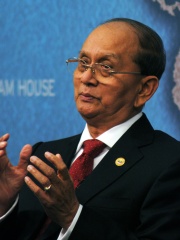
5. Thein Sein (b. 1944)
With an HPI of 69.87, Thein Sein is the 5th most famous Burmese Politician. His biography has been translated into 50 different languages.
Thein Sein (Burmese: သိန်းစိန်; IPA: [θéɪɰ̃ sèɪɰ̃]; born 20 April 1945) is a Burmese politician and retired army general who served as the eighth president of Myanmar from 2011 to 2016. He previously served as 11th prime minister from 2007 to 2010, and was considered by many in and outside Myanmar as a reformist leader in the post-junta government. His government undertook a series of political reforms including some deregulation of the country's censored media, releasing many political prisoners and halting the country's controversial large Chinese-led hydro-power project. The developments that followed included Myanmar's appointment to chair ASEAN in 2014, improved relations with the United States, the release of Aung San Suu Kyi – his 2015 general election rival – from house arrest, and the reinstatement of major opposition party National League for Democracy (NLD) in the by-election held on 1 April 2012.

6. Myint Swe (1951 - 2025)
With an HPI of 69.39, Myint Swe is the 6th most famous Burmese Politician. His biography has been translated into 33 different languages.
Myint Swe (Burmese: မြင့်ဆွေ; pronounced [mjɪ̰ɰ̃ sʰwè]; 24 June 1951 – 7 August 2025) was a Burmese politician and army officer who was Vice President of Myanmar from 30 March 2016, and Acting President of Myanmar from 1 February 2021 until his death in 2025, though withdrawing for health reasons on 22 July 2024. He also served as the acting president from 21 March 2018 to 30 March 2018 after the resignation of President Htin Kyaw, and the chief minister of Yangon Region from 30 March 2011 to 30 March 2016. A member of the military proxy Union Solidarity and Development Party, he was an ethnic Mon and a lieutenant general in the Myanmar Army. Myint Swe was installed as acting president by the Tatmadaw through a coup d'état on 1 February 2021, after which he immediately declared a state of emergency and formally transferred power to coup leader Min Aung Hlaing. Throughout his political career, Myint Swe worked to ensure the Tatmadaw's influence in politics. He was rarely seen in public after the coup, with Min Aung Hlaing serving as the face of the government. Myint Swe's main role in the military government was to formally grant and renew Min Aung Hlaing's emergency powers.

7. Min Aung Hlaing (b. 1956)
With an HPI of 69.09, Min Aung Hlaing is the 7th most famous Burmese Politician. His biography has been translated into 44 different languages.
Min Aung Hlaing (born 3 July 1956) is a Burmese army general who has ruled Myanmar under various titles since seizing power in 2021, and has led the Tatmadaw (armed forces) as Commander-in-Chief of Defence Services since 2011. He first served as Chairman of the State Administration Council and as well as the 12th prime minister from 2021 to 2025, and then as the member of the National Defence and Security Council exercising presidential duties since 2024 and as Chairman of the State Security and Peace Commission since 2025. Born in Minbu, Min Aung Hlaing studied law at the Rangoon Arts and Science University before joining the military. Rising through its ranks, he became a senior general by 2013. During the period of civilian rule from 2011 to 2021, he work to ensure the military's continued role in politics and forestalled the peace process with ethnic armed groups. A United Nations fact-finding mission found he deliberately perpetrated the Rohingya genocide. He maintained an adversarial relationship with democratically-elected State Counsellor Aung San Suu Kyi, though she defended him against genocide charges. Min Aung Hlaing baselessly claimed widespread voting irregularities and electoral fraud in the 2020 Myanmar general election, in which Aung San Suu Kyi's National League for Democracy (NLD) won a landslide re-election. He then seized power from her in the 2021 coup. He had been expected to run for President of Myanmar had the military proxy party, the Union Solidarity and Development Party (USDP), won enough seats in parliament to elect him, and would have been required to retire as Commander-in-Chief of Defence Services due to a statutory age limit. With the outbreak of mass protests against his rule, Min Aung Hlaing ordered a clampdown and suppression of demonstrations, sparking an ongoing civil war. Min Aung Hlaing's forces have employed scorched earth tactics in the civil war, including airstrikes on civilians. He has ordered the execution of prominent pro-democracy activists, the first use of the death penalty in decades. In February 2024, he activated Myanmar's People's Military Service Conscription Law to draft 60,000 young people into the Tatmadaw. In foreign policy, he has resisted influence from Association of Southeast Asian Nations (ASEAN) and relied on greater cooperation with Russia, China, and India. In response to his human rights abuses and corruption, Min Aung Hlaing and his government have been subjected to an extensive series of international sanctions, returning Myanmar to its former status as a pariah state. The Economist Intelligence Unit's 2022 Democracy Index rated Myanmar under Min Aung Hlaing as the second-most authoritarian regime in the world, with only Afghanistan rated less democratic.

8. Than Shwe (b. 1933)
With an HPI of 68.75, Than Shwe is the 8th most famous Burmese Politician. His biography has been translated into 46 different languages.
Than Shwe (Burmese: သန်းရွှေ; pronounced [θáɰ̃ ʃwè]; born 2 February 1933) is a retired Burmese military officer who ruled Myanmar as the second chairman of the State Peace and Development Council and as well as the commander-in-chief of Defence Services from 1992 until his resignation in 2011 and also concurrently served as the eighth prime minister of Myanmar from 1992 to 2003. He previously served as the deputy commander-in-chief of Defence Services from 1985 and the vice chairman of the State Peace and Development Council and deputy prime minister of Myanmar from 1988 until 1992. Born in Kyaukse in Upper Burma, Than Shwe received military training and in 1953 joined the Tatmadaw (armed forces) and rose through the ranks. In 1985, he was appointed the deputy commander-in-chief of Defence Services. In 1988, following a coup d'état that followed the 8888 Uprising, Than Shwe was appointed the vice chairman of the newly formed State Peace and Development Council (SPDC) and deputy prime minister by Saw Maung, the new leader of Myanmar. In 1992, Saw Maung stepped down and Than Shwe immediately became the new leader of Myanmar. As head of state, Than Shwe played a major role in shaping the country's political landscape. He adopted the 2008 Constitution, implementation of various policies aimed at economic development, modernization and infrastructure improvements, and as well as also being involved in efforts to stabilize the country and manage internal conflicts. In 2011, Than Shwe announced his retirement and officially stepped down as head of state, facilitating the transition to his chosen successor, Thein Sein. As the head of the Armed Forces, he was succeeded by Senior General Min Aung Hlaing. While Than Shwe's leadership was marked by significant achievements, it also faced scrutiny and criticism, particularly regarding allegations of human rights abuses and restrictions on political freedoms. His tenure coincided with a period of political transition and international scrutiny, with Myanmar experiencing both internal and external challenges. Despite being retired, Than Shwe continues to wield significant influence within the military.

9. Bayinnaung (1516 - 1581)
With an HPI of 68.68, Bayinnaung is the 9th most famous Burmese Politician. His biography has been translated into 30 different languages.
Bayinnaung Kyawhtin Nawrahta (16 January 1516 – 10 October 1581) was King of Burma from 30 April 1550 until his death in 1581, during the Toungoo dynasty. His reign is considered one of the most momentous in Burmese history, famously described as "the greatest explosion of human energy ever seen in Burma." During his rule, he assembled the largest empire in Southeast Asian history, which encompassed much of present-day Myanmar, as well as the Shan States, Lan Na, Lan Xang, Manipur, and the Ayutthaya Kingdom. Though best remembered for his empire-building, Bayinnaung's most enduring legacy was the integration of the Shan States into the Irrawaddy valley administrative system. After conquering the Shan States between 1557 and 1563, he implemented a series of administrative reforms aimed at reducing the power of hereditary rulers, known as saophas, and aligning Shan governance and customs with lowland Burmese norms. These reforms effectively eliminated the persistent threat of Shan raids into Upper Burma, a source of instability since the 13th century. Bayinnaung's integration policy served as a model for successive Burmese monarchs, who continued his approach until 1885. However, Bayinnaung largely followed the prevailing Mandala administrative model across his vast and culturally diverse empire. His rule over the First Toungoo Empire was described as "an emperor without an empire" holding control through personal allegiance to Bayinnaung as a Chakravartin (Universal Monarch) from it sub-kingdoms, rather than to any institutions. While this loyalty endured during his lifetime, it rapidly unraveled after his death in 1581. Both the kingdoms of Ava and Ayutthaya revolted within just over two years, and by 1599, all vassal states had declared independence, resulting in the complete collapse of the empire. Bayinnaung is regarded as one of the three greatest Burmese monarchs and is commemorated with major landmarks in his name in modern Myanmar. He is also well known in Thailand, where he is remembered as "Conqueror of the Ten Directions". Despite being a former adversary of Ayutthaya, his influence in Thai historical consciousness stands as a testament to the scale and power of his reign.
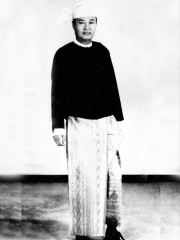
10. Ne Win (1910 - 2002)
With an HPI of 68.25, Ne Win is the 10th most famous Burmese Politician. His biography has been translated into 45 different languages.
Ne Win (born Shu Maung; 24 May 1911 – 5 December 2002) was a Burmese general and politician who served as Prime Minister of Burma from 1958 to 1960 and again from 1962 to 1974. He was also President of Burma from 1962 to 1981. Ne Win was Burma's military dictator during the Socialist Republic of the Union of Burma period of 1962 to 1988. Ne Win founded the Burma Socialist Programme Party (BSPP) and overthrew the democratic Union Parliament of U Nu in the 1962 Burmese coup d'état, establishing Burma as a one-party socialist state under the Burmese Way to Socialism ideology. Ne Win was Burma's de facto leader as chairman of the BSPP, serving in various official titles as part of his military government, and was known by his supporters as U Ne Win. His rule was characterized by a non-aligned foreign policy, isolationism, one-party rule, economic stagnation, and superstition. Ne Win resigned in July 1988 in response to the 8888 Uprising that overthrew the Burma Socialist Programme Party, and was replaced by the military junta of the State Law and Order Restoration Council (SLORC). He held minor influence in the 1990s but was eventually placed under house arrest, under which he died in 2002. There was no state funeral, public eulogy or monument in his memory. In foreign affairs, Ne Win followed a strictly neutralist policy during the Cold War, participating in the Non-Aligned Movement and keeping his distance from both the United States and the Soviet Union. On the other hand, his relations with Mao Zedong and the People's Republic of China were initially excellent, but were temporarily broken between 1967 and 1971, due to Mao's covert support for the Communist insurgency within Burma and the outbreak of anti-Chinese riots by regime supporters; however, in March 1971 relations were fully restored and Chinese economic aid continued.
People
Pantheon has 27 people classified as Burmese politicians born between 1015 and 1956. Of these 27, 7 (25.93%) of them are still alive today. The most famous living Burmese politicians include Win Myint, Thein Sein, and Min Aung Hlaing. The most famous deceased Burmese politicians include U Thant, Aung San, and U Nu.
Living Burmese Politicians
Go to all RankingsWin Myint
1951 - Present
HPI: 70.96
Thein Sein
1944 - Present
HPI: 69.87
Min Aung Hlaing
1956 - Present
HPI: 69.09
Than Shwe
1933 - Present
HPI: 68.75
Htin Kyaw
1946 - Present
HPI: 67.94
Khin Nyunt
1939 - Present
HPI: 57.46
Prakash Karat
1948 - Present
HPI: 46.66
Deceased Burmese Politicians
Go to all RankingsU Thant
1909 - 1974
HPI: 75.35
Aung San
1915 - 1947
HPI: 72.77
U Nu
1907 - 1995
HPI: 71.22
Myint Swe
1951 - 2025
HPI: 69.39
Bayinnaung
1516 - 1581
HPI: 68.68
Ne Win
1910 - 2002
HPI: 68.25
Alaungpaya
1714 - 1760
HPI: 67.89
Anawrahta
1015 - 1077
HPI: 66.64
Diana Abgar
1859 - 1937
HPI: 66.15
Thibaw Min
1859 - 1916
HPI: 65.59
Tabinshwehti
1516 - 1550
HPI: 63.86
Mindon Min
1808 - 1878
HPI: 63.81
Overlapping Lives
Which Politicians were alive at the same time? This visualization shows the lifespans of the 17 most globally memorable Politicians since 1700.

